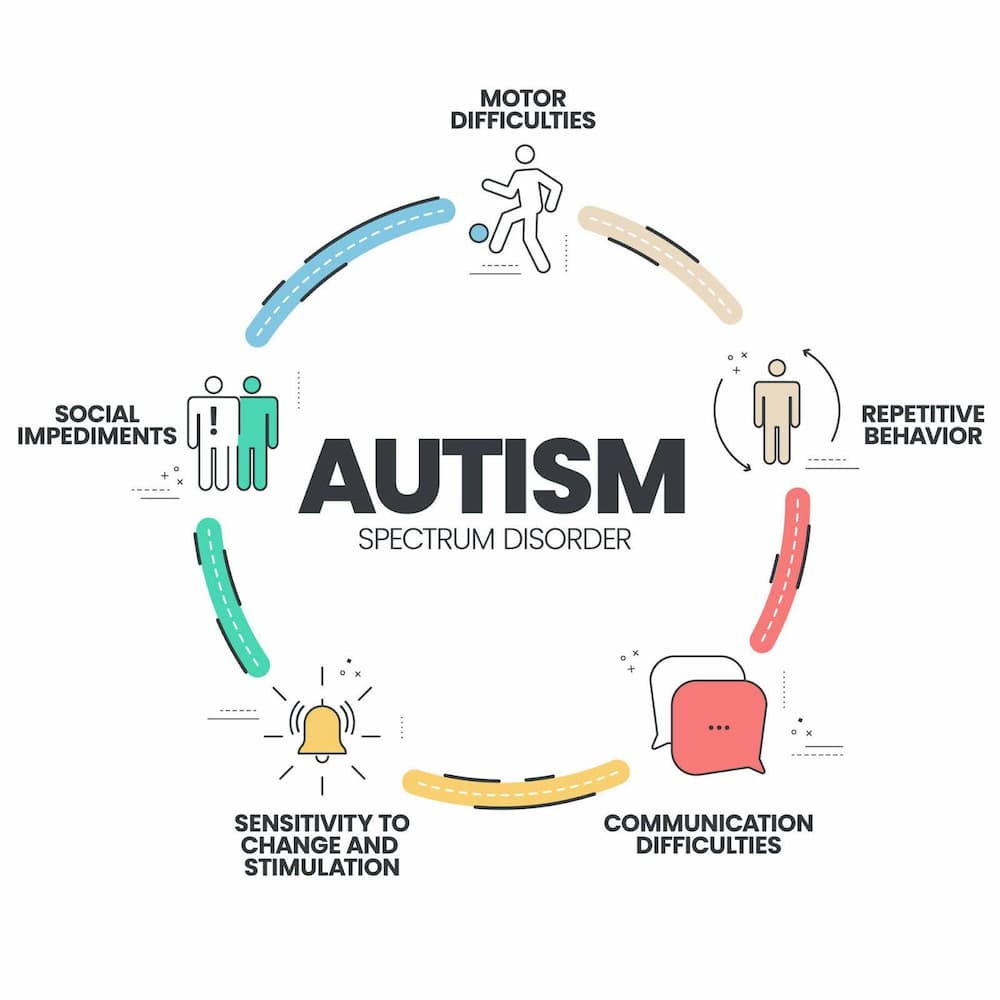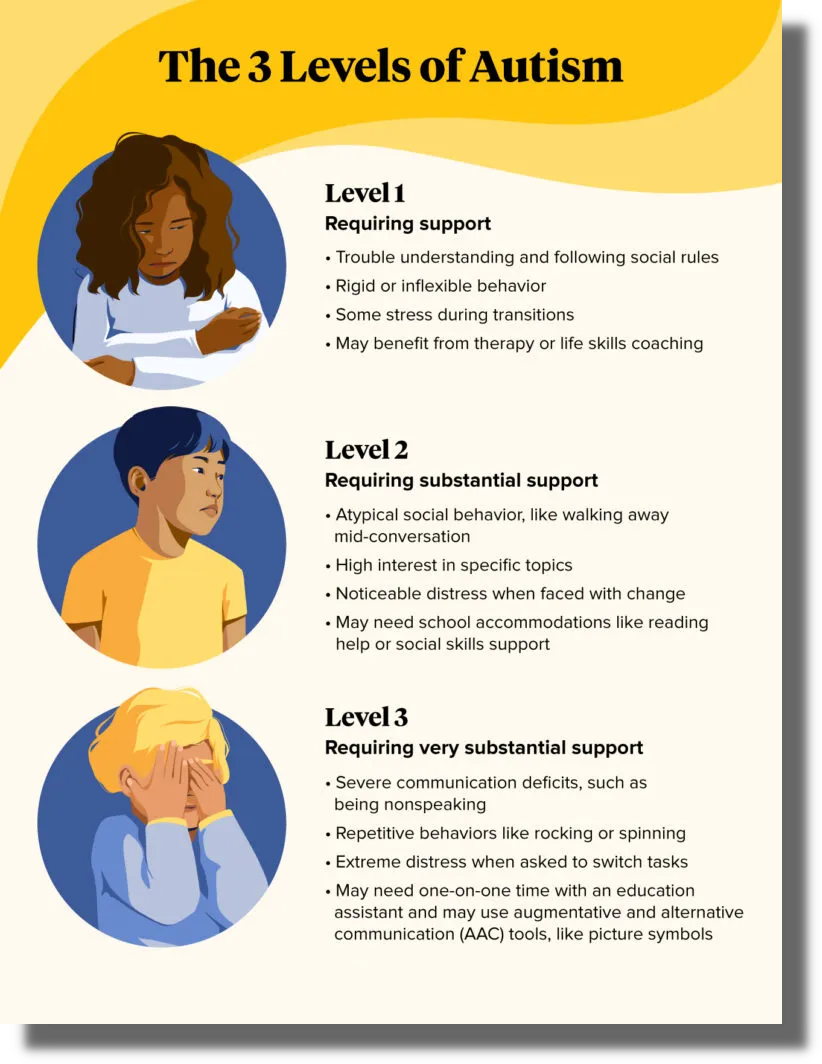Positives of guided interaction guided by an Autism Therapist
Positives of guided interaction guided by an Autism Therapist
Blog Article
Key Symptoms And Signs to Identify in Individuals With Behavioral Autism
When you run into someone with behavioral autism, recognizing vital indications and signs and symptoms is necessary. You might observe obstacles in social interactions and communication, in addition to a strong requirement for regimens. In addition, sensory level of sensitivities can result in overwhelming experiences. Comprehending these attributes can enhance your support and interventions, however there's even more to discover concerning just how these actions manifest in everyday situations. Let's explore what these indications truly appear like.
Challenges in Social Interactions
When you engage with somebody on the autism spectrum, you could see they battle with social hints and communication. These obstacles can make social communications feel frustrating for them.
In addition, you may find that they prefer regimens and familiar settings, which can restrict their determination to engage in brand-new social circumstances. They may talk concerning their interests in wonderful detail without noticing if you're interested when they do involve. This can lead to discriminatory conversations that leave you feeling separated. Recognizing these difficulties can aid you approach communications with compassion and persistence, cultivating a more comfy environment for both of you.
Difficulty With Verbal and Non-Verbal Interaction

Recognizing these signs is vital, as it assists you much better support and engage with individuals on the autism spectrum. By understanding their interaction obstacles, you can foster more meaningful links and give an extra helpful atmosphere.
Repeated Behaviors and Regimens
Interaction difficulties typically go along with other signs of autism, such as recurring habits and a strong preference for regimens. You may observe that people with autism commonly participate in certain, repeated activities, like hand-flapping, shaking, or repeating expressions. These habits can offer convenience and a feeling of control in a commonly overwhelming world.
Regimens are equally vital; lots of individuals grow when they comply with an organized routine. You might discover that adjustments to these routines can bring about considerable distress. If they have an everyday routine of consuming breakfast at a certain time or following a specific course to school, any type of disturbance can cause anxiety.
Acknowledging these patterns aids you understand their habits and give assistance. By accommodating their demand for regular and allowing repeated activities, you can produce a much more comfortable setting that relieves their challenges.
Sensory Level Of Sensitivities

Common Sensory Triggers
Sensory sensitivities can substantially impact day-to-day live for individuals with autism, as specific stimulations commonly set off frustrating reactions. Usual sensory triggers include loud noises, intense lights, and solid smells. You may see that sudden noises, like alarms or alarms, trigger anxiousness or distress. Fluorescent illumination in stores can feel uncomfortable and severe. Appearances can additionally play a significant function; rough materials or particular food appearances may be excruciating for you. Additionally, crowded places can overwhelm your senses, making it hard to kick back or concentrate. Comprehending these triggers can aid you handle your atmosphere much better. By being conscious of what impacts you, you can take actions to lessen pain and enhance your everyday experiences.
Behavior Actions Described
Understanding your behavioral feedbacks to sensory sensitivities is necessary, as they often expose just how you interact with the world. You may also find yourself seeking certain sensory experiences, like deep stress or quiet environments, to assist ground on your own. Identifying these patterns helps you understand your requirements much better and can assist just how you connect them to others.
Coping Strategies Summary
Identifying your sensory sensitivities is simply the very first action; now it's time to discover coping methods that can help you take care of those experiences successfully. Start by developing a sensory toolkit customized to your needs. Developing a structured regimen can likewise give predictability, minimizing anxiety around sensory overload.
Limited Interests and Emphasis
While many people develop a large array of rate of interests, those with autism usually demonstrate limited interests and an intense concentrate on particular subjects. You may notice that a person with autism can spend hours delving right into their favorite subject, whether it's a certain sort of train, a details film, or a clinical principle. This intense focus isn't simply a hobby; it can end up being a main component of their identification and social interactions.
You more tips here might discover that discussions revolve around these rate of interests, and they may have a hard time to engage in broader topics. By comprehending and acknowledging these restricted passions, you can cultivate an encouraging environment where they feel valued and understood, allowing for more purposeful links and communications.
Emotional Policy Difficulties
People with autism frequently encounter challenges in emotional law, which can be influenced by their intense emphasis on specific rate of interests. You could discover that when a person is deeply taken part in a preferred activity, they can experience strong feelings, whether exhilaration or disappointment. When things do not go as intended., this strength occasionally makes it hard for them to shift gears or manage their sensations - Aba Therapist.

Variability in Developmental Turning Points
When it comes to developing landmarks, you'll observe that people with autism often reveal a vast variety of variability. You might see a child succeed in language skills but battle with social communications.
It's necessary to recognize that each person's journey is one-of-a-kind. Observing these patterns can assist you understand their staminas and needs better.
Frequently Asked Concerns
Just How Is Autism Identified in Kid and Adults?
To detect autism in grownups and kids, professionals examine behavior, interaction abilities, and social Check This Out interactions. If a specific meets the requirements for autism range disorder., they typically make use of standard tests, interviews, and monitorings to establish.
Are There Different Types of Autism Range Disorders?
Yes, there are various kinds of autism spectrum disorders, consisting of Asperger's syndrome and pervasive developing disorder-not or else specified. Each type differs in intensity and characteristics, so comprehending these differences can aid you better support individuals with autism.
What Therapies Work for Individuals With Autism?
When thinking about effective therapies for individuals with autism, you'll discover choices like Applied Habits Evaluation, speech treatment, and work-related treatment. Each technique can aid boost interaction, social abilities, and everyday working tailored to private requirements.
Can Individuals With Autism Lead Independent Lives?
Yes, individuals with autism can lead independent lives. With the right support, abilities training, and sources, you can assist them establish self-sufficiency, handle daily tasks, and thrive in numerous settings, cultivating their self-reliance.
Exactly How Can Households Support Enjoyed Ones With Autism?
You can sustain your liked ones with autism by producing a structured environment, motivating their interests, exercising perseverance, promoting communication, and advertising social abilities. Celebrate their success, no issue exactly how small, and construct a helpful community.
Although many people on the autism spectrum can understand and make use of language, they often encounter significant obstacles continue reading this with both spoken and non-verbal communication. Identifying these signs is essential, as it helps you far better support and involve with individuals on the autism range. You might see that individuals with autism often involve in specific, repeated activities, like hand-flapping, rocking, or duplicating phrases.Sensory sensitivities can considerably affect daily life for individuals with autism, as particular stimuli commonly set off frustrating responses.When it comes to developmental turning points, you'll notice that individuals with autism usually show a large array of variability.
Report this page